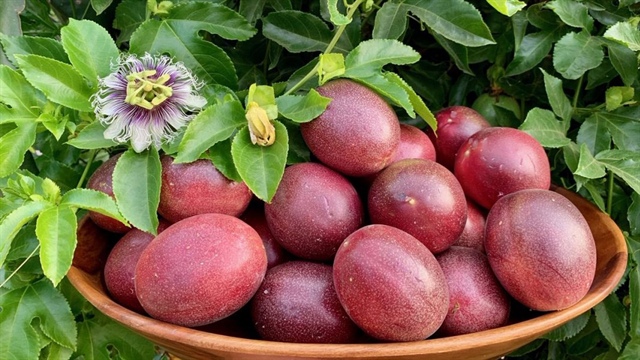China starts importing Vietnam passion fruit
China starts importing Vietnam passion fruit
Passion fruit is among Vietnam’s top 10 fruits with the highest export earnings.
China’s customs have authorized the import of passion fruit from Vietnam from July 2022, the first time for this kind of fruit, which is listed among Vietnam’s top 10 fruits with the highest export earnings.
The fruit would be shipped through the Pingxiang border gate, Dongxing City, Guangxi Province, China.

Passion fruit is one of Vietnam's top 10 fruits with the highest export earnings. File photo |
Chinese customs asked Vietnamese agencies to meet regulations on production management and phytosanitary, the Global Good Agricultural Practice (GlobalGAP) and the Vietnamese Good Agricultural Practice (VietGAP).
Vietnam’s Ministry of Agriculture and Rural Development (MARD) is in charge of supervising the quality and connecting exporters.
Over the past five years, Vietnam’s export of passion fruit has seen a rise of more than 300% in terms of quantity and value, listing Vietnam among the 10 biggest exporters of this item behind Brazil, Peru, and Ecuador. Passion fruit hubs in Vietnam are located in the north, Central Highlands, and the Mekong Delta.
So far, the fruit from Vietnam has reached choosy markets namely Australia, France, Germany, the Netherlands, South Korea, Switzerland, and Taiwan.
According to Nguyen Thanh Binh, the Chairman of the Vietnam Fruit Association, China is one of Vietnam's largest markets for farm produce, but its strict Covid-19 requirements have troubled exporters sometimes.
"Vietnamese exporters should switch trading models from unofficial channels to the official ones to better meet the requirements and avoid risks," he said.
In another move, trade between Vietnam and China through border gates in the first four months of this year fell 64% on year to US$4.15 billion, including Vietnam’s exports of $509 million (down 87%) and Vietnam’s imports of $3.64 billion (down 52.5%), according to statistics by the General Department of Vietnam Customs.
The decreased trading values were attributed to China’s strict Covid-19 regulations that clogged the transaction of goods, and seriously prolonged stuck at the border gates. The custom procedures were affected by restrictions coupled with poor logistics facilities at the border gates.
In 2021, China remained Vietnam’s biggest trading partner. In the same year, China was Vietnam’s second largest importer. The two-way trade climbed to $166 billion in 2021, with Vietnam’s trade deficit of $110 billion.
Last year, trade through border gates between Vietnam and China hit $42 billion. Vietnam’s main export staples include farm produce, phone accessories, and computers while importing machines and equipment, electronic devices, and electronic spare parts.

























